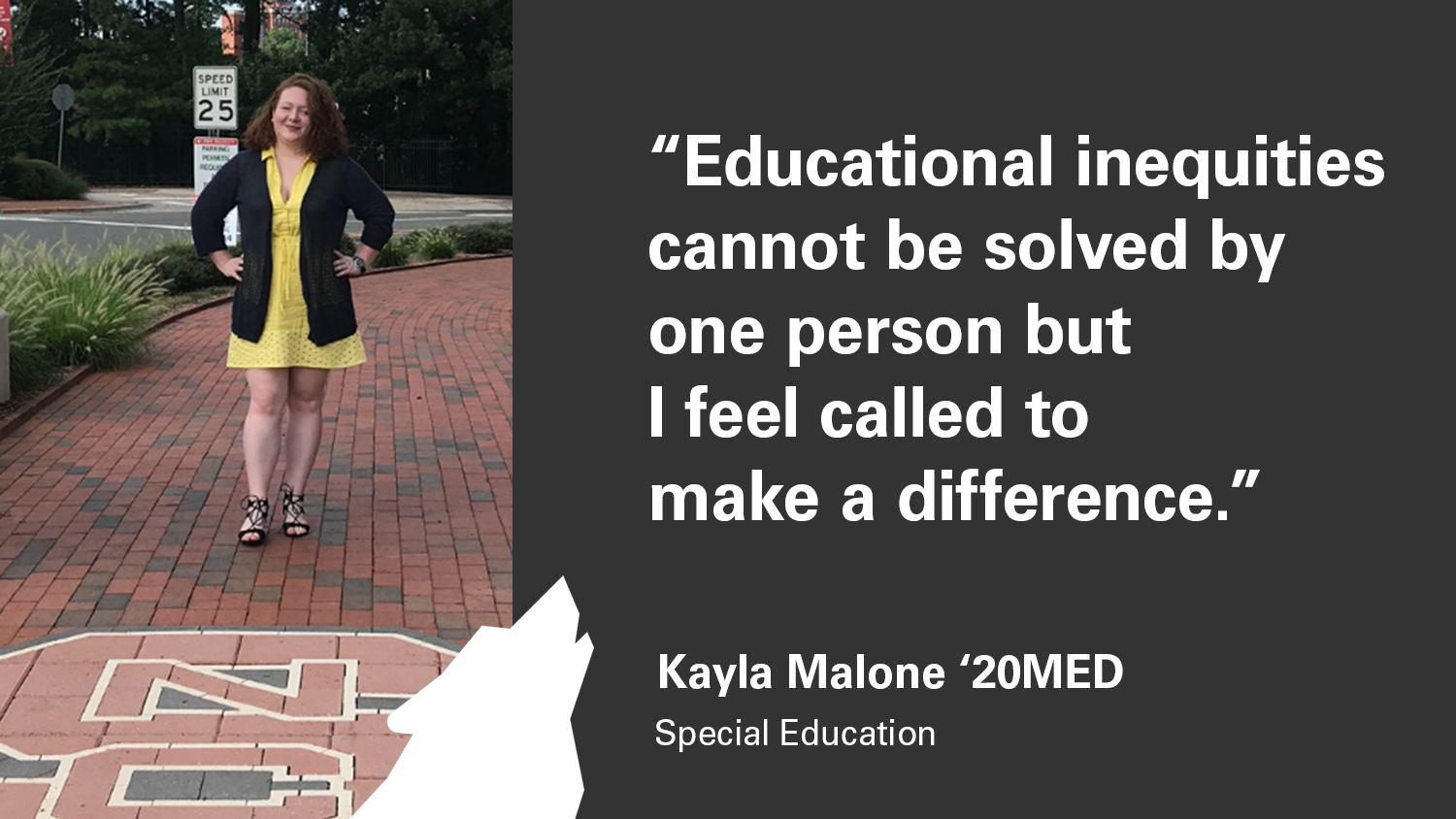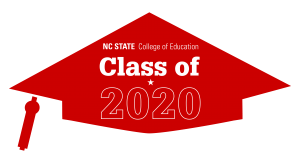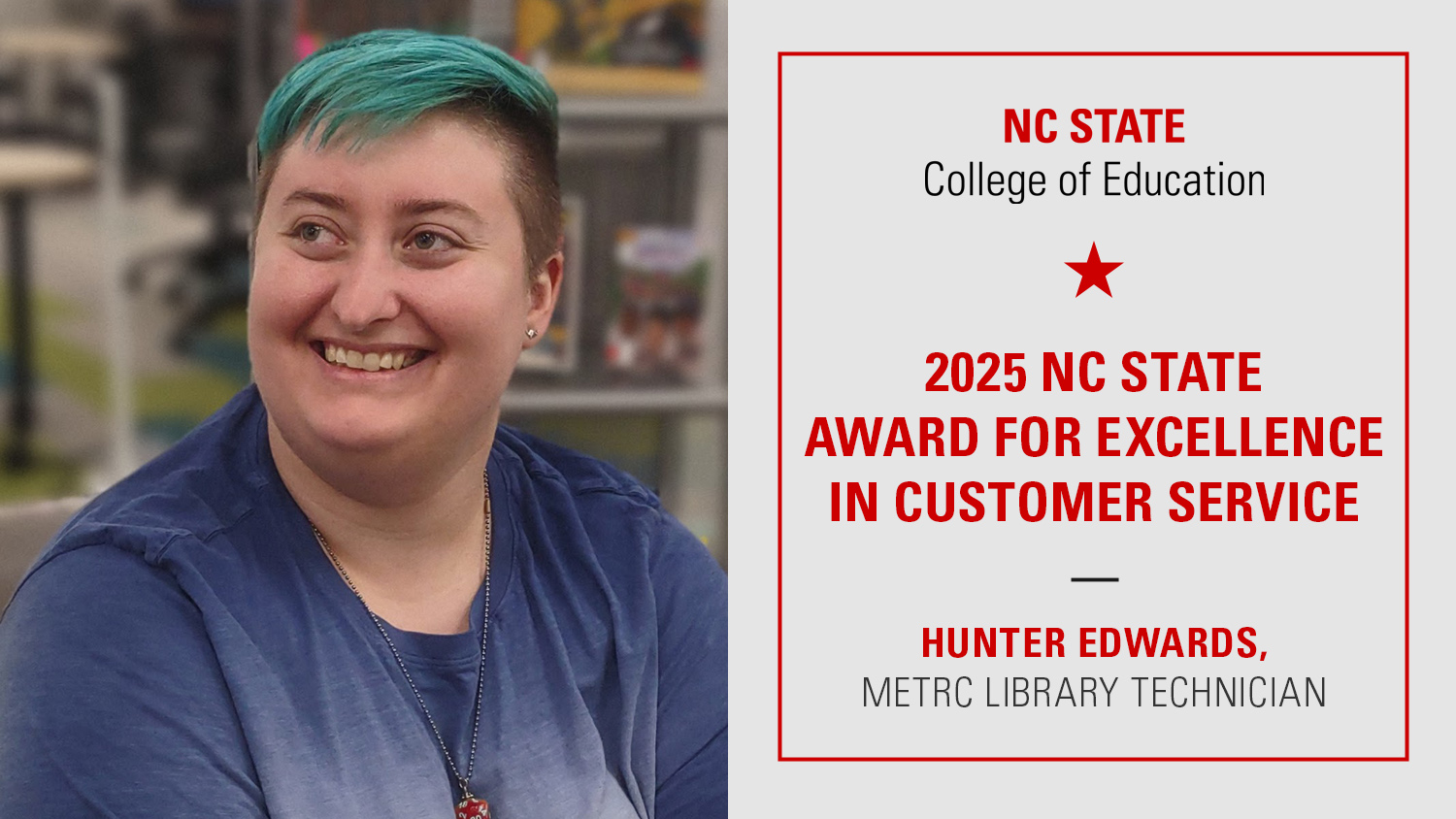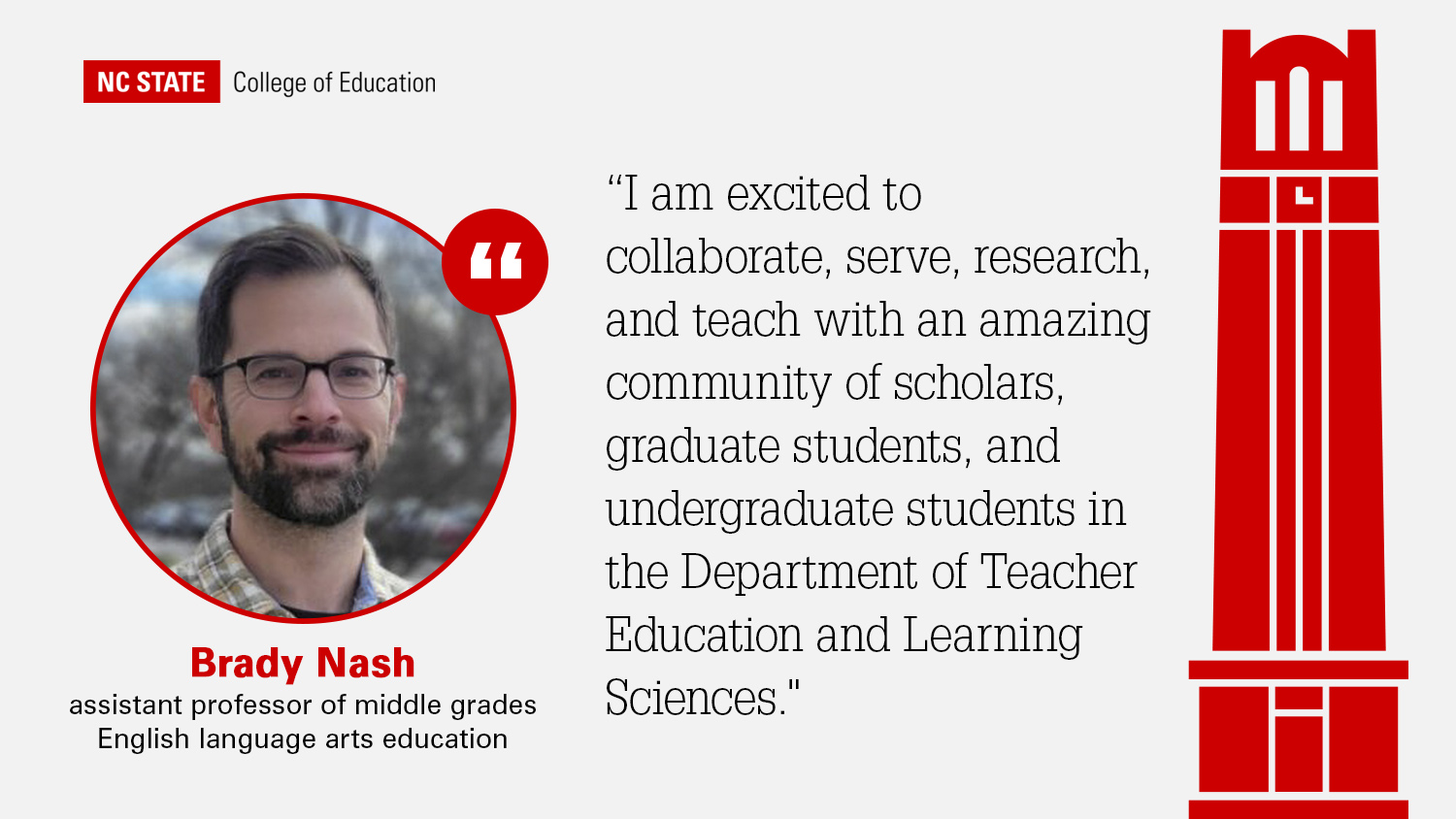Meet Kayla Malone ‘20MED: ‘Educational Inequities Cannot be Solved by One Person but I Feel Called to Make a Difference’

This is part of a series of profiles on students who are graduating in December 2020.
Kayla Malone ‘20MED attended underfunded schools as a child and faced many challenges and barriers growing up. But it was that experience that shaped her. As a first-generation college student, Malone has found her niche and hopes to have a positive impact on students while working to make education more accessible for all students from all backgrounds.
 While earning her Master of Education in special education, she has served as a data collector for Wolfpack WORKS and as a graduate research assistant for Fostering Advocacy, Communication, Empowerment, and Supports for African American Families of Children with Autism (FACES), where she has co-authored two published research articles.
While earning her Master of Education in special education, she has served as a data collector for Wolfpack WORKS and as a graduate research assistant for Fostering Advocacy, Communication, Empowerment, and Supports for African American Families of Children with Autism (FACES), where she has co-authored two published research articles.
Learn more about Kayla Malone.
Hometown: Willard, North Carolina
Area of Study: Special Education
Activities/Interests: Graduate research assistant on the FACES project, data collector for Wolfpack WORKS and Kappa Delta Pi Honors Society. My interests lie at the nexus of supporting families and students with autism, improving academic and literacy skills for students with autism, improving cultural competency of clinicians and teachers and implementing the values of the neurodiversity movement into the field of applied behavior analysis (ABA) and special education. I have also been simultaneously earning a graduate certificate in ABA at the Pennsylvania State University. Both programs have significantly shaped and informed me as an educator, leader, clinician and researcher by providing me with a well-rounded experience.
Why did you choose the NC State College of Education?
It was the incredible programs, projects and the amazing faculty who lead them that drew me to the College of Education. I wanted to get involved in projects that had a real impact on the community and students.
Why did you choose your area of study?
My first job out of college was working as a habilitation technician with young adults who had intellectual/developmental disabilities. I worked with a client in their late 30s, who had autism, cerebral palsy and high support needs. They communicated primarily by idiosyncratic sign language and nonverbal communication, such as gestures, body language, etc. This was my first experience working with an individual with complex communication needs. I wanted to learn more. I wanted to learn more about how I could develop functional communication and best support my client. I chose special education because I wanted to arm myself with the knowledge, skills and information that I needed to best serve others.
What do you hope to accomplish in your field after graduation?
I want to conduct impactful research that helps individuals, families and communities. I want to apply multidisciplinary theoretical frameworks to improve current evidence-based practices. I want to ultimately create paradigm shifts in current conceptualizations of special education, autism and ABA.
What’s your next step? What do you have planned after graduation?
My next step is to apply to Ph.D. programs.
How has the College of Education prepared you for that next step?
The College of Education has given me access to world-class faculty, resources and opportunities for growth. I have done various classroom placements, completed an internship and have been involved in several research projects within the college. I have gotten a well-rounded experience that has allowed me to exponentially grow as a leader, educator, clinician and researcher.
Do you have a favorite memory from your time in the College of Education?
My favorite memory would have to be when I travelled to a school for Wolfpack WORKS. I observed a teacher who was energetic and deeply passionate during her literacy instruction. She really knew how to capture her students’ attention and enthusiasm. I’ve never seen a teacher who was more connected to her students. It was one of those moments that made me realize that I was exactly where I needed to be.
Tell us about an experience you had with the College of Education that had the biggest impact on you or your career.
The experience that had the biggest impact on my career is getting published as a co-author in a refereed journal for the first time. I grew up as an impoverished student who went to underfunded schools. I wrote short stories and poems in my diary to help me survive. It was a very special moment in my life. This experience also led to more manuscripts to be written and to also be published. It was this first co-author experience that has allowed me to access other research opportunities and to continue to grow into a better writer, collaborator and educator.
How does it feel to be a first-generation college student? And what does that mean to you?
I feel a greater sense of pride in my accomplishments because I am a first-generation college student. My dad did not complete 10th grade and my mom received her high school equivalency diploma later in life. However, my parents always stressed the importance of education to me and my brothers. Being a first-generation college student has had its challenges and barriers, to say the least. In addition to socioeconomic barriers, I experienced other barriers such as culture shock when networking with others in my field. It meant that I had to figure out the hidden rules and expectations, the right questions to ask and what not to. However, being a first-generation college student shows that I can persevere, I am strong and I am determined.
Tell me about your experience on the FACES team. What did you learn from that experience?
I have worked on the FACES team as a graduate research assistant since my first semester at NC State in fall 2018. The FACES project is a community-based intervention designed to support Black families raising children with autism. As a member of the FACES team, I have co-authored two published research articles (Pearson, Meadan et al., 2020; Pearson, Traficante et al., 2020), co-authored one article under review (Pearson, et al., under review) and I am currently developing two additional manuscripts that are focused on projects related to FACES (Pearson, Malone et al., in preparation; Pearson, Malone, et al., in preparation). My primary responsibilities have been manuscript development, inter-institutional collaboration and providing assistance for community programming, project materials, and other project related needs. I have learned how to more effectively collaborate with others in a team in order to achieve goals and outcomes. I have learned so much about the experiences of the families and how important it is to highlight missing voices.
What were your research topics and what inspired those interests?
As I previously mentioned, we have two papers that have been published which I am a co-author on as a part of the FACES team. They both explore the experiences of families and professionals supporting Black children who have autism. We also have one paper that is under review which focuses on Black parents’ perceptions of autism, faith and coping. I joined FACES because I wanted to be involved in research projects that directly impacted communities. I am passionate about social justice and FACES has given me the opportunity to serve others and to explore that passion for social justice and educational equity.
Why did you choose education?
I took a Sociology of Education course as an undergraduate student majoring in sociology. I remember feeling galvanized because I was once a poor student, who went to underfunded schools and who often didn’t have enough resources. I remember how I used to internalize growing up poor as being less than. Educational inequities cannot be solved by one person but I feel called to make a difference. I chose education because I wanted to have a positive impact on students by making education more accessible. I want to reduce barriers for students and their families to get them the knowledge they need to maximize their quality of life.
- Categories:


